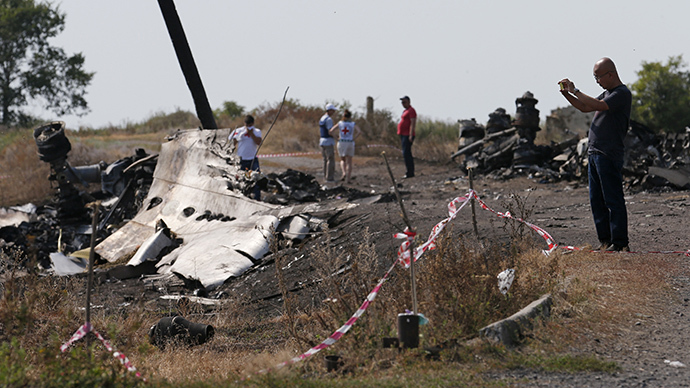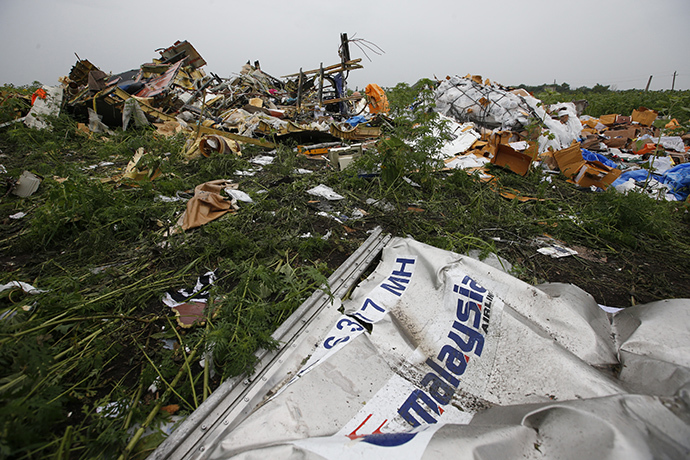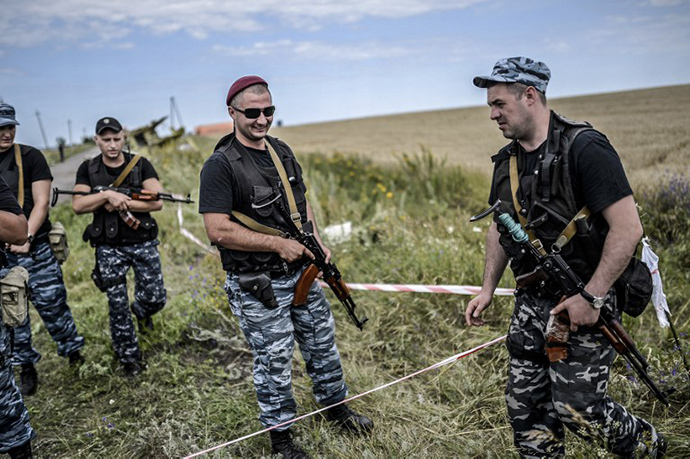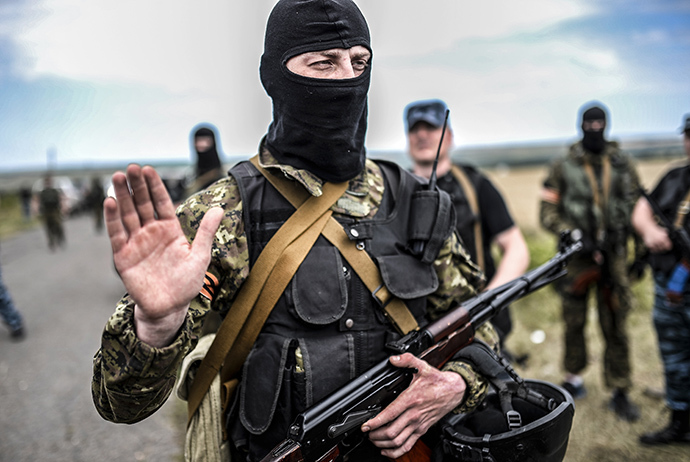'Not terrorists': Hysteria over MH17 fails to take account of both law and facts

It’s not every day you see a blog published on Oxford University Press (OUP) that is so riddled with legal flaws, you would pull your hair out in frustration if a student had composed it.
However, Thursday was obviously not an ordinary day, as OUP saw fit to publish this masterpiece by Bournemouth Associate Professor and Lieutenant Colonel in the German Army Reserves, Sascha-Dominik Bachmann. In his article, Bachmann, a one-time military exchange officer to the US, compares the downing of Malaysian Airlines flight MH17 to the sinking of the Lusitania (a passenger ship) by German forces during World War I, as well as the shooting down of Iran Air flight 655 by American forces in 1988, before announcing: “What has become clear already today is Russia’s potential new role as state sponsor of terrorism.”
This is quite a conclusion to come to, and we will get to the various ways in which Mr Bachman made some illogical leaps that would see any third-year law student who took it into their head to be so careless with sorely rapped knuckles.
But first let me note that the “Russia sponsors terrorism” line was circulating around long before doomed MH17 met its fate. In fact, in May a petition to designate Russia a “State- sponsor of terrorism” had already allegedly garnered 100,000 signatures in the United States. Bachmann’s article and similar accusations, therefore, picks up on a ready-made narrative, and crams the MH17 catastrophe into that narrative.
Who constructed this narrative of a Putin-led Russia somehow in favor of terrorists complete with ready-made petition? Concerned citizens appalled by some unspecified Russian behavior?
Or Alex Konanykhin, former Russian oligarch who has been wanted in Russia since Yeltsin’s days to face charges relating to embezzlement and financial fraud and whose American business ventures include WikiExperts.us (which accepted money to write Wikipedia entries for businesses until it was banned), and Transparent Business (which allows employers to monitor their employees’ computer activity in real time), and who was the Republican National Committee’s choice for New York Businessman of the Year in 2004?
Three guesses and the first two don’t count
Despite originating from a questionable source, Konanykhin’s work has apparently prepared the “Russia sponsors terrorism” line, in much the same way as the Bene Gesserit prepared the hapless residents of Dune to accept the Kwisatz Haderach in Frank Herbert’s famous dystopian novels. First invent the narrative, then press the facts into it. It might have been OK for science-fiction, but law isn’t supposed to work this way.
There are three questions to be answered in regards to MH17: one factual and two legal. The factual question is whether or not the Donetsk rebels shot down MH17 by accident. We do not know the answer to this question at the time of writing, but hopefully this will be revealed. The rest of this article examines how we would answering the two legal questions under the assumption that the factual question has been answered and the Donetsk rebels did indeed shoot down MH17 under the mistaken belief that it was a fighter jet. It is obviously a large assumption, but considering that accusations of sponsoring terrorism are now being bandied about on academic blogs, I think it is well worth exploring.

The first legal question is whether or not accidentally shooting down a passenger plane when you meant to shoot down a fighter jet could be classified as an act of terrorism. In my opinion, the answer is a resounding ‘no.’
Crack open any textbook on criminal law and you’ll find that intent forms a pretty basic part of most crimes. There are some things you simply cannot do by accident and being a terrorist is one of them. So, even if the Donetsk rebels unintentionally killed the passengers of MH17 that does not make them terrorists, because their intentions and factual actions do not match up. In this case, all one is left with is an intent (here to shoot down a fighter jet) and a negligent act (shooting down a passenger plane). Negligence resulting in death may be criminal under ordinary domestic law, but it does not transform the negligent person into a terrorist. When the US shot down Iran Air Flight 655 killing all 290 people on board, the “international community” did not label the United States terrorists, they labeled them idiots. Even Iran only termed the incident “a criminal act.” If we were to say that accidentally shooting down a plane is an act of terrorism then everyone who has ever negligently caused a ten-car pile-up on the highway, accidentally left the gas oven on and burned down a building, or unwittingly fed a wedding party salmonella-infested chicken, is a terrorist.
The Donetsk rebels may have attempted to commit an “act of terrorism,” namely shooting down a Ukrainian fighter jet. But even this action could only be construed as an act of terrorism if the rebels around Donetsk were common criminals and not parties to a civil war. This is a very thorny issue under international law, and therefore it is jaw-dropping that anyone would publish a blog on this topic without examining the all-important question as to whether the rebels around Donetsk are party to a civil war, especially since several aspects uphold this interpretation.
The rebels have been in position for several months now. They clearly control an area of territory which the Ukrainian army cannot penetrate and they obviously possess a certain level of organization, not to mention clearly formulated goals. Once a movement gets to that stage, you have to at least entertain the possibility that the situation amounts to a civil war. It is always a tough call to make, but the manner in which past cases have been treated usually sheds some light on the correct answer, particularly cases that are only recently past. In this context, it is noteworthy that the rebels in Syria and Libya seem to have acquired the status of parties to a civil war (and not “terrorists”) quite quickly. Months into the conflict in Libya, the rebels were acknowledged by Western powers to be the official government of Libya, although they had capacities not much beyond what the Donetsk rebels currently possess. That there is a civil war going on in Ukraine is at least debatable, and therefore it should be debated in a legal article that is going to do something as serious as accuse a State of sponsoring terrorism. Anything less is careless in the extreme. Personally, I would assess the situation in Ukraine as reaching the threshold to qualify as a civil war. The International Committee of the Red Cross agrees.

If you are in a war different laws apply. Bachmann’s article flips back and forth between claiming that shooting down MH17 (even apparently by accident) is a war crime and an act of terrorism, but both cannot be true at the same time. In a conflict, you are allowed to kill people who are officially on the opposing side. It is just about the only thing you are still allowed to do under the laws of war. Of course, you are not allowed to kill civilians on purpose, but killing them by accident (and we are working off the admittedly broad assumption that that is what happened here) is so common that the United States invented a term for it: collateral damage. Being a victim of collateral damage is basically just bad luck. In cases of genuine negligence on the part of the military personnel involved, it might result in some kind of military discipline being exercised against them. But the situation is different than under normal civilian law, and there is no international crime called: “Made a Horrible Mistake” or “Failure to Properly Take Aim”. To sum up, we probably have a civil war going on in Ukraine.
People get killed in wars and these are overwhelmingly civilians. Armed combatants make mistakes with terrible consequences, but that does not mean that they are terrorists. It means they made a mistake.
So much for the first point.
The second point those claiming Russia is sponsoring terrorism omit to deal with is the link between Russia and the Donetsk rebels, or to be more accurate, the lack thereof.
The Lusitania and Iran Air Flight 655 are not comparable cases to the downing of MH17 in this regard. In both of these situations, it was crystal-clear that the vessel was directly taken down by State forces, i.e. the actual armed forces of a nation, not “rebels” loosely associated with a nation in some yet-to-be-determined way. The actions of soldiers are attributable to the State they belong to – when they attack a target, the State they belong to is responsible for that attack. It is automatic. When some rebels in another country attack a target, well….so what? You would have to prove a link between that State and whatever the rebels were said to have done. There needs to be some connection between these two things, and it needs to be more sophisticated then “they look close together on the map.”
The comparable case here is therefore, not the Lusitania or Flight 655, but Nicaragua and that Bachmann did not mention this case in his entire article beggars belief. Nicaragua is THE CASE about helping rebels (of any sort) on foreign territory. It is completely inconceivable for anyone with an even passing acquaintance with international law to overlook this case. It would be like a carpenter forgetting to put the roof on a house.
What was the famous Nicaragua case all about?
It was about the help that the United States gave an armed group known as the Contras in their attempts to overthrow the government of Nicaragua in the 1980s. Let’s be clear on what kind of “help” this was. US officials did not accidentally leave a missile instruction manual lying around or make vague sympathetic murmurings. They paid the Contras’ costs (probably raising the funds through a black-op to sell weapons to Iran and by allowing drug trafficking to the United States), trained the Contras for years, and gave them sophisticated manuals about how to induce psychological damage in ordinary Nicaraguans so that they would be more receptive to Contra rule. The tactics used by the Contras, and lifted at least partially from the infamous American “Psychological Operations in Guerilla Warfare” included random and widespread kidnappings, rape, murder and destruction of property. That’s right. The US was paying Nicaraguans to randomly murder other Nicaraguans in order to terrify ordinary people into submission. The US also thoughtfully mined all of Nicaragua’s harbors. A slightly different category of help than merely failing to condemn “rebels,” which so far seems to the be the only thing Russia is certainly doing. The US approach to the Contras was somehow…what is the word, I am looking for? Ah yes, terrifying.
Moreover, the proof that was brought against the US in Nicaragua far outstripped even the wildest accusations made regarding any possible relationship between Russia and the Donetsk rebels. The Donetsk rebels are not raping and pillaging the countryside, nor has Russia done something equivalent to mining Ukraine’s harbors. It is always possible that additional facts will emerge to change our perceptions, but I doubt that anything that emerges will ever rise to a point comparable to what happened in Nicaragua, which was only said to be an unlawful use of force, not “State-sponsored terrorism.” Furthermore, the Court found that even in this case, the Contras’ concrete actions could not be directly attributed to the United States.

This is significant, because even though Nicaragua won its case at the International Court of Justice against the US, the US never paid Nicaragua the compensation it was ordered to and eventually got Nicaragua to withdraw its complaint on this point after a change of government. That means something very interesting: the Court thought that what the US did in Nicaragua was illegal under international law, but since the US refused to comply with the Court’s ruling, apparently the US thought that the decision was incorrect and that their aid to the Contras was in fact legal. They have never accepted that this sort of interference with another state’s rebels was wrong. This means that the famous Nicaragua decision remains the high-water mark of condemnation in helping another state’s rebels. It does not get more condemnatory than that. The international community was unable to enforce even a punishment for handing out manuals, training and money in return for intentional random assassinations of innocent civilians. In the face of that, the idea that anyone would seriously consider accepting that a link amounting to state responsibility exists between Russia and the Donetsk rebels on the sole basis that MH17 was shot down by a weapons system first developed by the Soviet Union but now used by States all over the region, is ridiculous.
It is sad and disturbing that law and academia as professions should turn to trying cases in the press instead of trying them in a court, and that a university blog should have withheld such relevant and important facts from its readership. By accusing Russia of sponsoring terrorism, the OUP blog is giving its readership the impression that this is what is at stake here, when the truth is that the way international law stands, even if the hypothesis of the Donetsk rebels shooting down MH17 by mistake was true, this would not even remotely be the case. The entire escapade would still just be a tragic accident. There is no way to twist this event into an excuse for leveling accusations at Russia that its opponents would like to be true, and blogs like this one misinform people about possible legal outcomes. It is a blatant betrayal of our responsibility to research and inform. Lawyers and academics are supposed to provide facts, not act like Frank Herbert’s Bene Gesserit preparing the ground for a made-up reality of convenience by planting a made-to-order narrative into unsuspecting minds.
The situation is volatile and we do not yet know if there will be a credible investigation into MH17’s crash or what its outcome will be, but in a court of law, facts come first and judgment second.
The statements, views and opinions expressed in this column are solely those of the author and do not necessarily represent those of RT.
The statements, views and opinions expressed in this column are solely those of the author and do not necessarily represent those of RT.












